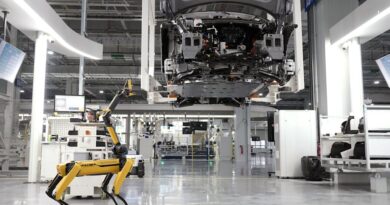Industrial Automation: Trends to Watch in 2024
Have you ever wondered how factories are getting smarter? In 2024, industrial automation is set to evolve even further. Lets explore the trends that will shape this exciting field.
What is Industrial Automation?

Industrial automation refers to the use of technology to control equipment in factories, boilers, heat treating ovens, switching on telephone networks, and other applications. It aims to boost efficiency, reduce human error, and cut costs. Think of it like having a smart assistant that handles repetitive tasks so that people can focus on more complex work.
Why Should You Care About Automation Trends?

As businesses turn to automation, it affects everything from the products you buy to job opportunities in your area. Staying aware of these trends helps you understand how industries are changing. It can also prepare you for potential career shifts or new job opportunities.
What Are the Key Trends in 2024?

Here are some significant trends to watch in the world of industrial automation:
- Increased Use of AI and Machine Learning
- Rise of Collaborative Robots (Cobots)
- Focus on Cybersecurity
- Emphasis on Sustainability
- Expansion of the Internet of Things (IoT)
How Will AI and Machine Learning Change Automation?

Artificial Intelligence (AI) and machine learning are game-changers. They allow machines to learn from data and improve over time. For instance, imagine a factory that analyzes production data to predict when a machine might fail. This helps prevent downtime and keeps operations smooth.
A recent survey found that 61% of manufacturers plan to invest in AI in the next few years. This trend means more efficient production lines and better quality control.
What Are Collaborative Robots (Cobots)?
Collaborative robots, or cobots, work alongside people. Unlike traditional robots that operate in isolation, cobots assist workers without replacing them. This partnership enhances productivity while keeping employees safe.
For example, in a car manufacturing plant, a cobot might handle heavy parts, allowing human workers to focus on assembly and quality checks. This collaboration makes work easier and faster.
Why is Cybersecurity Important in Automation?
As automation grows, so do the risks of cyberattacks. Factories are increasingly connected to the internet, making them vulnerable. In 2024, cybersecurity will take center stage to protect sensitive data and systems.
Businesses will adopt stronger security measures, such as advanced firewalls and encryption, to safeguard their operations. Investing in cybersecurity helps prevent costly downtime and data breaches.
What About Sustainability?
Sustainability is a significant concern for many industries today. Automation can help reduce waste and improve energy efficiency. In 2024, expect more companies to adopt eco-friendly practices.
For instance, automated systems can optimize energy use in factories, cutting costs and lowering environmental impact. This trend not only helps the planet but can also enhance a company’s reputation and appeal to consumers.
How is the Internet of Things (IoT) Shaping Automation?
The Internet of Things connects devices and systems to the internet, allowing them to communicate and share data. In manufacturing, IoT sensors can monitor equipment performance in real-time.
This connectivity leads to predictive maintenance, which means machines can alert operators before they fail. As a result, companies can save money on repairs and reduce downtime. In 2024, the IoT will continue to transform how factories operate.
What Challenges Will Industrial Automation Face?
While automation offers many benefits, it also comes with challenges. Here are some common concerns:
- Job Displacement: Many fear that robots will take over jobs.
- High Initial Costs: Implementing automation can be expensive.
- Skill Gaps: Workers may need new skills to work alongside advanced technologies.
Companies must address these challenges to ensure a smooth transition to automated systems.
How Can Workers Prepare for Changes in the Industry?
As automation evolves, workers should seek opportunities to learn new skills. Consider taking courses in programming, data analysis, or robotics. Many online platforms offer free or affordable training.
Networking within your industry can also help you discover new job opportunities. Attend workshops or join professional organizations to stay informed about industry trends.
What Does the Future Hold?
The future of industrial automation is bright. With advancements in AI, cobots, and IoT, we can expect faster, more efficient factories. However, it’s vital for companies and workers to adapt to these changes.
As we approach 2024, businesses that embrace automation will likely thrive. Those who resist may find themselves left behind. Are you ready for the changes ahead?
Takeaway Points
Here are some key points to remember about industrial automation in 2024:
- AI and machine learning will enhance efficiency.
- Collaborative robots will work alongside human workers.
- Cybersecurity will be crucial to protect operations.
- Sustainability will drive eco-friendly practices.
- The Internet of Things will enable real-time monitoring.
Staying updated on these trends will help you navigate the evolving landscape of industrial automation. Whether you’re a business owner or an employee, being informed is your best strategy for success.
For more information on industrial trends, consider reading this article on [Manufacturing.net](https://www.manufacturing.net/home/article/21109157/5-manufacturing-trends-to-watch-in-2024).
Are you excited about these changes? What trends do you think will have the most significant impact on your industry? The conversation has just begun!



